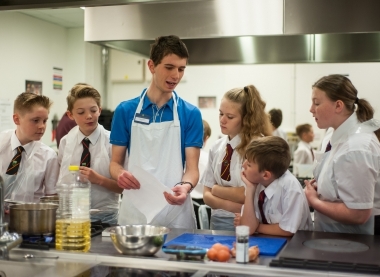Education
Latest
Guidance on online encounters for Gatsby Benchmarks 5 and 6
Online encounters and experiences that take place between students and employers are happening to a greater extent than ever before due to the Covid-19 pandemic, while face-to-face contact is not possible. The current focus on digital solutions has prompted questions about which online activities count as a meaningful encounter with employers (Gatsby Benchmark 5) and workplace experiences (Gatsby Benchmark 6). The Careers & Enterprise Company and the Gatsby Charitable Foundation have listened to the experiences of schools, colleges and others in the careers community and have used this early learning to provide initial guidance to Careers Leaders. Sir John Holman, author of the report that laid out the Benchmarks writes here about how this guidance stays true to the ethos of the report.

During this extraordinary time I know many Careers Leaders have been unsure how to deliver certain Gatsby Benchmarks, particularly Benchmarks 5 (Encounters with Employers), 6 (Experiences of workplaces) and 7 (Encounters with Further and Higher Education). I hope the new guidance from The Careers & Enterprise Company will provide you with clear answers, and I’d like to take a moment to say why it offers the best approach in a difficult situation.
When I began writing the Benchmarks for Good Career Guidance, based on an international study, my intention was to provide schools and colleges with a clear, usable framework, bringing together all the disparate activities that happen across schools, colleges and employers to support Career guidance. The Benchmarks work as a whole, and each one is as important as any other.
That is why I’ve been so concerned about the difficulties of delivering Benchmarks 5, 6 and 7 during this pandemic. Between them, these Benchmarks give young people a 360 degree view of the world of work, and equip them to make their own decisions about future courses of study and training. They provide breadth of knowledge, by exposing students to a range of different employment and education settings, challenging common stereotypes along the way. But they also encourage students to build a deeper knowledge of work by spending longer periods of time focusing on one workplace. These experiences of the breadth and depth of work, and future study and training options, help students to make truly informed decisions about their next steps.
Given the choice, I’m sure we would all prefer for the experiences of these Benchmarks to happen face-to-face. But we are living in unprecedented times, and we need to find another solution that can bring the benefits of these Benchmarks to all students. That’s why in this guidance we’ve clearly emphasised the importance of making these virtual encounters two-way. All teachers know that interactive activities are more impactful and lasting, and this is just as true in Careers. There is an unpredictability to two-way human conversation that I believe is critical – a static video can’t answer the questions of young people, when they don’t know yet themselves what they want to ask. Making a virtual experience interactive brings it closer to the real world.
I know that even before covid-19 these three Benchmarks were already challenging for some schools/colleges, especially in isolated areas. I am sure that as we learn, as a community, about intelligent virtual encounters we will discover things that will be valuable as we return to something closer to normal. We can then take these learnings and use them in the future, alongside traditional in-person encounters, to ensure that pupils can learn about all the options open to them.
Finally, I’d like to thank everyone involved in Careers – especially Careers Leaders – for all you are doing to keep Careers high on the agenda in schools and colleges: good Careers guidance will be more important than ever in the uncertain future that lies ahead. At the Gatsby Foundation we are working closely with the CEC, as well as listening to the community, to see where we can support schools and colleges in the medium and long term. We want to make sure that the momentum in Careers, built up over the last few years, isn’t lost to this crisis. If you would like to share your thoughts on where the biggest barriers to careers will be, then do get in touch by emailing careerguidance@gatsby.org.uk.

